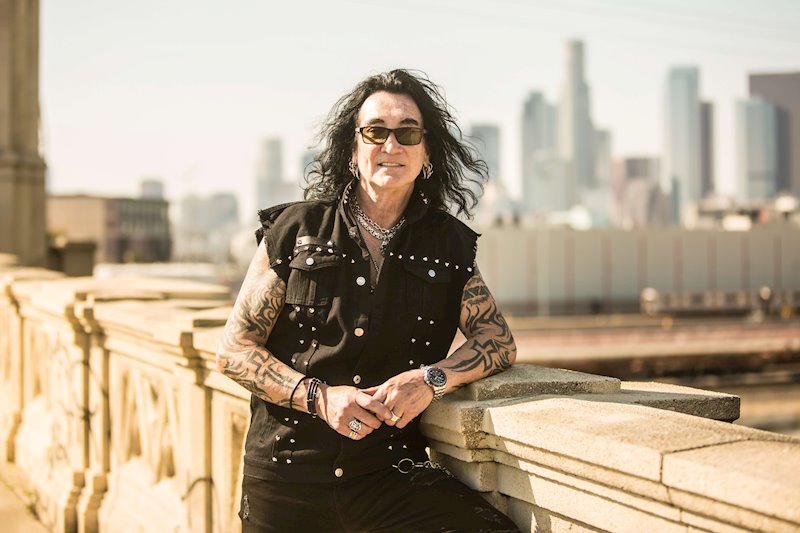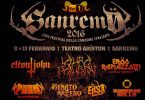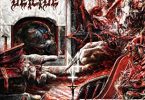Heavyworlds.com had the pleasure of speaking with Robin McAuley about his latest album, “Soulbound”. In this interview, he shares insights on the album’s heavier sound, his collaboration with talented musicians, and his thoughts on the evolution of rock in the digital age.
[ENG]
- Hello and welcome to Heavyworlds.com! It’s a pleasure to have you here. How are things going so far?
I’m doing great Heavyworlds. Thanks for having me along with these questions.
- “Soulbound” has been described as a more aggressive, guitar-driven album compared to your previous solo efforts. What led you to embrace this heavier sound, and how much of that decision was influenced by your producer Aldo Lonobile and the musicians you worked with on this record?
Before we started to write the songs for SoulBound I decided that this record should have a harder edge. I particularly wanted a more guitar driven than my two previous records. I really like the sound Andrea Seveso has created for my records and so I wanted him featured more than before. Working together with Aldo has created that sound that I wanted for this record. Edgier, more aggressive, but still keeping everything melodic with memorable hook lines. Strong melodies from the vocals and guitars have always been important to me. I think we achieved that on Soulbound and I’m very happy with how the record finished up.
- The album title “Soulbound” suggests a deep connection, whether to oneself, to music, or to something spiritual. What does the concept of being “soulbound” mean to you personally, and how does it manifest throughout the songs on this album?
Aldo introduced me to the song, written by two Swedish writers, Teresa Persson and Jan Akesson. When I heard the track I immediately fell in love with the melody, and so I demoed the song to fit my style of vocals. Sent it to Aldo and he also liked it, and so we decided it would be a great song for the record. I also really liked the title “Soulbound” and at that point I also decided it would be a great title for the record. I never really discussed the meaning of the lyrics with the writers but suffice to say it had a profound impact on me. We all fight with our demons and it’s good to have a safe place to find peace and solace. Serenity……You’re the stronghold when I am in need.
- Over the years, you’ve worked with legendary guitarists, including Michael Schenker and Reb Beach. With “Soulbound”, you’re working with Andrea Seveso and Alessandro Mammola. What was it like crafting this record with them, and how would you compare their styles to the guitarists you’ve collaborated with in the past?
Great question? Working with Michael Schenker for all of these years has been an amazing experience. He’s revered as one of the greatest guitar players in rock music, and it’s an honor for me to be able to share the same stage with him. It’s been Forty Years (40) since McAuley Schenker and we have so much History working together, and still do to this day. Reb Beach is also revered not only has a great guitar player but also a great songwriter. His history with the band Winger and Whitesnake speaks for itself given the many hits they have had over the years. Working with Reb in Black Swan is so inspiring for me and makes me work harder to find strong melodies that work well with his songwriting. We have just finished recording our 3rd Black Swan Record for Frontier’s Music Srl and we hope you won’t be disappointed. Andrea Seveso and Alessandro Mammola are two amazing guitarists coming from a new generation, bringing their fresh and incredible talents to my record for all to hear. I consider myself extremely lucky to be surrounded by such great guitarists and musicians.
- As you release “Soulbound”, what do you hope fans take away from this album, and what message do you want to leave them with as they experience it?
I’m very happy with the songwriting on “Soulbound”. The best I can hope for is that people will give it a listen and enjoy the songs and the sounds that they hear. Music is a labor of love for me, it’s my happy place, and I hope you find your happy place somewhere in my music also.
- Your lyrics often carry messages of resilience, inner strength, and overcoming adversity. Is this something you consciously infuse into your songwriting, or is it simply a reflection of who you are and what you’ve experienced in your life?
I believe there’s a little of everything in my lyrics. I like to read, watch movies, although usually scary movies, psychological movies and that sort of thing. I love developing stories in my songwriting that can be interpreted in more where’s than one. I suppose there are strong elements of good versus evil in my songwriting but I always mean it in a positive way for the listener who at the end of the day will walk away with their own interpretation.
- “Bloody Bruised and Beautiful” is such a striking title, it suggests pain, struggle, but also a sense of triumph. Can you walk us through the inspiration behind this song and what it means to you?
Written by myself and Giancarlo Floridia. Definitely deals with rejection and pain while suffering a great loss. Not a nice place to be, but life has a bad habit of throwing the unexpected curve ball at us and as a result we emerge stronger and more resilient. We all need strong coping mechanisms.
- “Wonders of the World” is another intriguing title on the album. Can you share the story behind this track? Is it a song about finout of atragic ding beauty in the world, or does it have a deeper, more personal significance?
Also written by myself and Giancarlo Florida and David Julian. I suppose you could interpret it as a spiritual kind of song, dealing with someone you always look to or need when the going gets rough. I need something or someone in my life to believe in strongly. It’s what keeps me going.
- If you could isolate one song on the album that best encapsulates what “Soulbound” is all about, both musically and thematically, which track would you choose and why?
I think “There Was A Man” says it all for me. I felt it was the best track to finish the record. Like the last question you asked, it’s important that I have something to work towards. A positive journey to take and always grateful for everything that I have. Perhaps that doesn’t work for everyone but it does for me.
- You’ve written and performed songs in different musical landscapes, from hard rock and metal to more melodic, AOR-driven material. Do you find it easier to express yourself lyrically in a heavier, more aggressive setting, or do you prefer the storytelling aspect of more melodic rock?
I love good stories always. That said I always find that the music dictates the direction I write my lyrics. It’s amazing to me how we find words for all the music while still trying to make it different. People love a good story 🙂
- With streaming services, social media, and digital platforms, artists today have more control over their music but also face new challenges in standing out. Do you think this shift has made things easier or harder for rock musicians compared to when you first started?
Social Media is so important in today’s world to make contact with a broader audience. We complain a lot about social media and yet we are stuck right in the middle of using it to its fullest potential. Unfortunately there are those who use it in a negative fashion. YouTube and Instagram and Facebook are great tools that are easy to use, so that people can hear the music that we create and share. Playlists on Spotify create easy access to our Music and I think it’s great. You can make a whole record in your living room and post it to social media so that everyone can hear it. How easy is that.
- Many classic rock bands from the ’70s and ’80s are still actively touring and recording, while newer rock acts struggle to reach the same heights. Why do you think fans remain so loyal to the classic era, and do you see any modern bands that have the potential to carry that legacy forward?
There are so many great new young bands that keep the legacy of rock music alive and well. I think we should support them more and give them as many opportunities as they deserve. The classics will always be with us because they are classics and the fans never seem to tire of this very influential period. TV commercials, Radio, Movies, they have always supported the Classics. The big budgets from the 70s and 80s or not there in most cases for younger newer bands. But social media is a great outlet to get their music to the masses. Not every band in the 70’s and 80’s had an easy ride.
- Over the years, you’ve performed in massive arenas, intimate venues, and everything in between. Do you have a preference, and how does the energy of the crowd affect your performance?
I have always loved the Festivals and still do. Looking out from the stage at so many smiling and excited faces is still one of the greatest experiences I have ever witnessed. One fan or 40K fans, they all matter and deserve the best performance of your life. I’m Blessed!!
- The term “rock star” used to carry a certain larger-than-life mystique, but today’s industry often demands constant online engagement from artists. Do you miss the mystery of the old-school rock era, or do you think direct fan interaction has helped artists stay relevant?
I think it’s very important to spend time with the fans. To say hello, to listen to them, shake their hand and make them feel special. Without the fans we have nothing. I personally have never liked the term rockstar or super group. I just love the music and I’m especially happy when the fans like it too and come out to see you. Respect!!
- Looking back at your entire career, what’s one piece of advice you wish someone had given you when you were first starting out in the music industry?
Sign nothing until you are sure of what it is your signing!!!!!!
- That was the last question. Thank you so much for your time. Is there anything you would like to say to your fans or Heavywords readers?
You have many choices and many artists to listen to. I hope you will give my Music a chance, give it a listen, give me a like, and share it. I hope you like “Soulbound” and I thank you for spending time with me. Take care of yourselves, stay safe, love and be loved. Life is good, enjoy it. Thank you so much, you guys Rock!!!!!!

[ITA]
- Ciao e benvenuto su Heavyworlds.com! È un piacere averti qui. Come stanno andando le cose finora?
Sto benissimo, Heavyworlds. Grazie per avermi qui insieme a queste domande.
- “Soulbound” è stato descritto come un album più aggressivo e incentrato sulla chitarra rispetto ai tuoi precedenti lavori da solista. Cosa ti ha portato ad abbracciare questo sound più pesante e quanto di questa decisione è stato influenzato dal tuo produttore Aldo Lonobile e dai musicisti con cui hai lavorato per questo disco?
Prima di iniziare a scrivere le canzoni per Soulbound, ho deciso che questo disco dovesse avere un’impronta più dura. Volevo in particolare che fosse più incentrato sulla chitarra rispetto ai miei due dischi precedenti. Mi piace molto il sound che Andrea Seveso ha creato per i miei album e quindi ho voluto che fosse più in evidenza rispetto a prima. Lavorare insieme ad Aldo ha creato il sound che volevo per questo disco: più tagliente, più aggressivo, ma mantenendo comunque tutto melodico, con ritornelli memorabili. Le melodie forti, sia per le voci che per le chitarre, sono sempre state importanti per me. Penso che ci siamo riusciti con Soulbound e sono molto felice di come è venuto fuori il disco.
- Il titolo dell’album, Soulbound, suggerisce una connessione profonda, che sia con se stessi, con la musica o con qualcosa di spirituale. Cosa significa per te personalmente il concetto di soulbound e come si manifesta nelle canzoni di questo album?
Aldo mi ha fatto conoscere la canzone, scritta da due autori svedesi, Teresa Persson e Jan Akesson. Quando ho sentito il brano, mi sono immediatamente innamorato della melodia, quindi ho registrato una demo per adattarla al mio stile vocale. L’ho mandata ad Aldo e anche a lui è piaciuta, quindi abbiamo deciso che sarebbe stata una grande canzone per il disco. Mi è piaciuto molto anche il titolo Soulbound e a quel punto ho deciso che sarebbe stato un ottimo titolo anche per l’album. Non ho mai discusso davvero il significato dei testi con gli autori, ma basti dire che ha avuto un impatto profondo su di me. Tutti combattiamo con i nostri demoni ed è bello avere un luogo sicuro dove trovare pace e conforto. Serenity… You’re the stronghold when I am in need. (Serenità… Sei la roccaforte quando ho bisogno).
- Nel corso degli anni hai lavorato con leggendari chitarristi, tra cui Michael Schenker e Reb Beach. Con Soulbound stai collaborando con Andrea Seveso e Alessandro Mammola. Com’è stato creare questo album con loro e come paragoneresti il loro stile a quello dei chitarristi con cui hai lavorato in passato?
Bella domanda! Lavorare con Michael Schenker per tutti questi anni è stata un’esperienza incredibile. È venerato come uno dei più grandi chitarristi della musica rock, ed è un onore per me poter condividere il palco con lui. Sono passati quarant’anni (40) da McAuley Schenker e abbiamo così tanta storia lavorando insieme, e lo facciamo ancora oggi. Reb Beach è anche lui molto stimato, non solo come grande chitarrista, ma anche come grande autore di canzoni. La sua storia con le band Winger e Whitesnake parla da sé, dato il numero di successi che hanno avuto nel corso degli anni. Lavorare con Reb in Black Swan è per me fonte di grande ispirazione e mi spinge a lavorare ancora di più per trovare melodie potenti che si adattino bene al suo songwriting. Abbiamo appena finito di registrare il nostro terzo album di Black Swan per Frontier’s Music Srl e speriamo che non rimaniate delusi. Andrea Seveso e Alessandro Mammola sono due chitarristi straordinari, appartenenti a una nuova generazione, che portano i loro talenti freschi e incredibili nel mio album, affinché tutti possano ascoltarli. Mi considero estremamente fortunato ad essere circondato da chitarristi e musicisti così straordinari.
- Con l’uscita di “Soulbound”, cosa speri che i fan traggano da questo album e quale messaggio vuoi lasciare loro mentre lo ascoltano?
Sono molto felice del songwriting di Soulbound. La cosa migliore che posso sperare è che la gente gli dia un ascolto e apprezzi le canzoni e i suoni che sente. La musica è un lavoro d’amore per me, è il mio posto felice, e spero che anche voi possiate trovare il vostro posto felice nella mia musica.
- I tuoi testi spesso trasmettono messaggi di resilienza, forza interiore e superamento delle avversità. È qualcosa che inserisci consapevolmente nei tuoi brani, o è semplicemente un riflesso di chi sei e delle esperienze che hai vissuto nella tua vita?
Credo che nei miei testi ci sia un po’ di tutto. Mi piace leggere, guardare film – anche se di solito film horror, psicologici e cose di quel genere. Amo sviluppare storie nelle mie canzoni che possano essere interpretate in più modi. Suppongo che ci siano forti elementi di bene contro male nel mio songwriting, ma lo intendo sempre in modo positivo per l’ascoltatore, che alla fine della giornata se ne andrà con la propria interpretazione.
- “Bloody Bruised and Beautiful” è un titolo così forte: suggerisce dolore, lotta, ma anche un senso di trionfo. Puoi raccontarci l’ispirazione dietro questa canzone e cosa significa per te?
È stata scritta da me e Giancarlo Floridia. Affronta sicuramente il rifiuto e il dolore derivante da una grande perdita. Non è un bel posto in cui trovarsi, ma la vita ha la brutta abitudine di lanciarci curve inaspettate, e come risultato ne usciamo più forti e più resilienti. Tutti abbiamo bisogno di meccanismi di difesa solidi.
- “Wonders of the World” è un altro titolo intrigante dell’album. Puoi raccontarci la storia dietro questo brano? È una canzone sulla ricerca della bellezza nel mondo nonostante la tragedia, o ha un significato più profondo e personale?
Anche questa è stata scritta da me, Giancarlo Floridia e David Julian. Suppongo si possa interpretare come una canzone dal carattere spirituale, che parla di qualcuno a cui ti rivolgi o di cui hai bisogno quando le cose si fanno difficili. Ho bisogno di qualcosa o qualcuno nella mia vita in cui credere fermamente. È ciò che mi dà la forza di andare avanti.
- Se dovessi isolare una canzone dell’album che incapsula al meglio il significato di “Soulbound”, sia musicalmente che tematicamente, quale sceglieresti e perché?
Penso che “There Was A Man” riassuma tutto per me. Sentivo che fosse il brano perfetto per chiudere il disco. Come nella domanda precedente, è importante per me avere qualcosa verso cui lavorare. Un viaggio positivo da intraprendere ed essere sempre grato per tutto ciò che ho. Forse non funziona per tutti, ma per me sì.
- Hai scritto e interpretato canzoni in diversi paesaggi musicali, dall’hard rock e metal a materiale più melodico e orientato all’AOR. Trovi più facile esprimerti a livello lirico in un contesto più aggressivo e pesante, o preferisci l’aspetto narrativo del rock più melodico?
Amo sempre le belle storie. Detto questo, trovo che sia la musica a dettare la direzione in cui scrivo i miei testi. È incredibile per me come riusciamo a trovare parole per tutta la musica, pur cercando di renderla sempre diversa. La gente ama una bella storia. 🙂
- Con i servizi di streaming, i social media e le piattaforme digitali, oggi gli artisti hanno più controllo sulla propria musica, ma affrontano anche nuove sfide per emergere. Pensi che questo cambiamento abbia reso le cose più facili o più difficili per i musicisti rock rispetto a quando hai iniziato?
I social media sono così importanti nel mondo di oggi per entrare in contatto con un pubblico più ampio. Ci lamentiamo spesso dei social media eppure siamo nel mezzo, sfruttandoli al massimo del loro potenziale. Purtroppo, c’è anche chi li usa in modo negativo. YouTube, Instagram e Facebook sono strumenti fantastici e facili da usare, che permettono alle persone di ascoltare la musica che creiamo e condividiamo. Le playlist su Spotify offrono un accesso immediato alla nostra musica e penso che sia fantastico. Puoi creare un intero disco nel tuo salotto e pubblicarlo sui social media affinché tutti possano ascoltarlo. Quanto è facile?
- Molte band rock classiche degli anni ‘70 e ‘80 continuano ancora oggi a fare tour e registrare album, mentre le nuove band rock faticano a raggiungere gli stessi livelli di successo. Perché pensi che i fan rimangano così fedeli a quell’epoca e vedi qualche band moderna con il potenziale per portare avanti quella legacy?
Ci sono così tante nuove band giovani e talentuose che mantengono viva l’eredità della musica rock. Penso che dovremmo supportarle di più e dare loro tutte le opportunità che meritano. I classici resteranno sempre con noi perché sono classici, e i fan sembrano non stancarsi mai di quel periodo così influente. Pubblicità in TV, radio, cinema… i classici sono sempre stati supportati. I grandi budget degli anni ‘70 e ‘80 nella maggior parte dei casi non esistono più per le band più giovani e nuove. Ma i social media sono un ottimo strumento per portare la loro musica alle masse. Non tutte le band degli anni ‘70 e ‘80 hanno avuto un percorso facile.
- Nel corso degli anni hai suonato in enormi arene, locali intimi e ogni tipo di palco. Hai una preferenza? E come influisce l’energia del pubblico sulla tua performance?
Ho sempre amato i festival e li amo ancora oggi. Guardare dal palco e vedere così tanti volti sorridenti ed entusiasti è ancora una delle esperienze più incredibili che abbia mai vissuto. Un fan o 40.000 fan, tutti contano e meritano la migliore performance della tua vita. Sono fortunato!
Il termine “rock star” un tempo portava con sé un certo alone di mistero più grande della vita, ma l’industria di oggi spesso richiede un coinvolgimento online costante da parte degli artisti. Ti manca il mistero dell’epoca rock vecchia scuola, o pensi che l’interazione diretta con i fan abbia aiutato gli artisti a rimanere rilevanti?
Penso che sia molto importante passare del tempo con i fan. Dire ciao, ascoltarli, stringere loro la mano e farli sentire speciali. Senza i fan non abbiamo nulla. Personalmente, non mi è mai piaciuto il termine rockstar o super gruppo. Amo semplicemente la musica e sono particolarmente felice quando ai fan piace anche e vengono a vederti. Rispetto!!
Guardando indietro a tutta la tua carriera, qual è un consiglio che avresti voluto ricevere quando hai iniziato nell’industria musicale?
Non firmare nulla finché non sei sicuro di cosa stai firmando!!!!!!
- Questa era l’ultima domanda. Grazie mille per il tuo tempo. C’è qualcosa che vorresti dire ai tuoi fan o ai lettori di Heavyworlds?
Avete molte scelte e molti artisti da ascoltare. Spero che darete una possibilità alla mia musica, che le darete un ascolto, che mi mettiate un like e la condividiate. Spero che vi piaccia “Soulbound” e vi ringrazio per aver passato del tempo con me. Prendetevi cura di voi stessi, state al sicuro, amate e lasciatevi amare. La vita è bella, godetevela. Grazie mille, voi ragazzi siete fantastici!!!!!!






